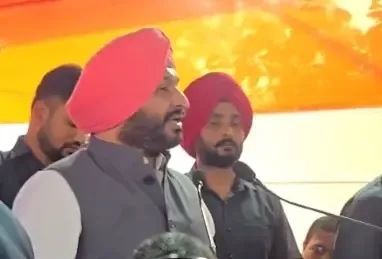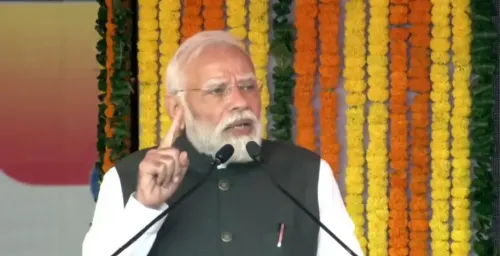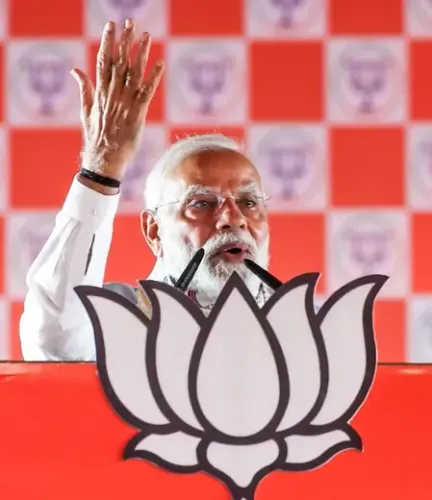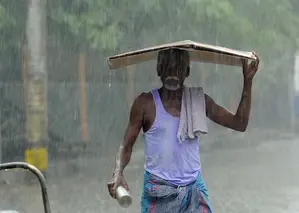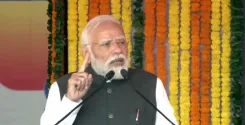How Did People Brave Heavy Monsoon Rain to Celebrate the Dalai Lama's 90th Birthday?
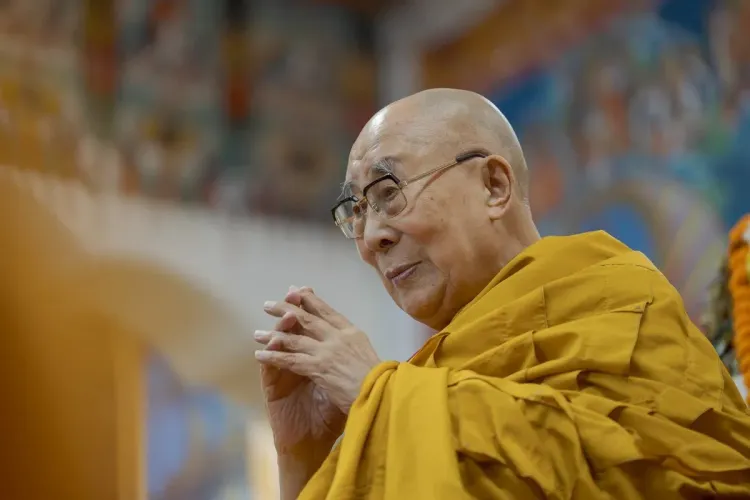
Synopsis
Key Takeaways
- Dalai Lama celebrates 90 years as a spiritual leader.
- Global leaders acknowledge his influence on peace.
- Significant gatherings of Tibetan exiles demonstrate devotion.
- The 'Year of Compassion' aims to promote his values worldwide.
- The Dalai Lama confirms he will have a successor.
Dharamsala, July 6 (NationPress) Despite facing heavy monsoon rains and dense fog, Tibetan exiles, monks, and supporters gathered on Sunday to celebrate the 90th birthday of their revered spiritual leader, the Dalai Lama, in McLeodganj, a charming hill station located in the outskirts of the northern town of Dharamsala. This town has attracted many Western visitors since the Dalai Lama settled here in 1960 after fleeing Tibet.
A large crowd started to gather early in the morning at the Tsuglagkhang temple to partake in the birthday festivities.
"Special prayer sessions were conducted for the well-being and longevity of the Dalai Lama," a spokesperson for the Tibetan government-in-exile shared with IANS.
Situated on a hilltop, the Tsuglagkhang temple is in proximity to the official residence of the Dalai Lama.
Born on July 6, 1935, in a farming family from a small village in Taktser, northeastern Tibet, the two-year-old boy, originally named Lhamo Dhondup, was recognized as the reincarnation of the 13th Dalai Lama, Thubten Gyatso, in 1937.
In his message, Prime Minister Narendra Modi expressed prayers for the Dalai Lama's ongoing good health and longevity.
"I join 1.4 billion Indians in sending our warmest wishes to His Holiness the Dalai Lama on his 90th birthday," PM Modi stated in a post on the social media platform X.
"He serves as a lasting symbol of love, compassion, patience, and moral integrity. His teachings have garnered respect and admiration across diverse faiths. We pray for his continued health and long life," PM Modi added.
Currently, the Prime Minister is in Rio De Janeiro, Brazil, for a four-day visit, participating in the 17th BRICS Summit and conducting a state visit.
The Prime Minister's wishes come amidst discussions regarding the Dalai Lama's successor, with Chinese Foreign Ministry spokesperson Mao Ning advising India to be cautious in its statements and actions regarding Tibet-related issues.
US Secretary of State Marco Rubio also conveyed his best wishes to the Dalai Lama.
"The US is steadfast in its commitment to advocate for the human rights and fundamental freedoms of Tibetans. We support efforts to preserve their unique linguistic, cultural, and religious heritage, including their right to choose and honor their religious leaders without external interference," stated the US Department of State.
The 14th Dalai Lama, known as the 'Voice for the Voiceless,' hopes to continue his life for many more years.
As he approached his 90th birthday, the Nobel Peace Laureate confirmed that he will indeed have a successor, dispelling speculation about the future of the 600-year-old institution after his passing.
To honor this remarkable milestone, the democratically-elected Central Tibetan Administration (CTA), representing Tibetans both inside and outside Tibet, has proclaimed that the period from July 2025 to July 2026 will be recognized as the "Year of Compassion".
This initiative aims to celebrate the Dalai Lama not only as a spiritual figure but also as a global advocate for peace, compassion, secular ethics, and interfaith unity.
In a message delivered the day before his birthday, the Dalai Lama emphasized, "I will continue to dedicate myself to the promotion of human values, religious harmony, and the teachings of ancient Indian wisdom, which illuminate the workings of the mind and emotions, alongside the rich culture and heritage of Tibet that has much to contribute to global peace and compassion. I cultivate determination and courage in my daily life through the principles taught by the Buddha and Indian sages such as Shantideva, whose aspirations I strive to uphold."
The Dalai Lama, who escaped Tibet in March 1959 following a failed uprising against Chinese governance, advocates for a 'middle-way' approach, seeking greater autonomy for Tibet rather than full independence.
Beijing considers the Dalai Lama a "separatist".

